When Peter Kuo, a Silicon Valley businessman whose family immigrated to the US from Taiwan when he was a teenager, ran for Vice Chair of the California Republican Party in 2019, a series of stories published by one of the state’s most well-known political bloggers detailed Kuo’s significant business relationships in both China and Russia. The point the blogger, Aaron Park, was making was that while Kuo owned numerous corporations, none of them seemed to be particularly lucrative, and that Kuo might be a bit of a con man. Based on those stories many party insiders wondered if perhaps Kuo was a Chinese asset, but those questions and any criticism of Kuo’s business dealings were shouted down by Kuo and his allies as “racism.”
Kuo was elected and then re-elected in 2021; in his appearances he regularly and tearfully tells the story of how his family left Taiwan and how much he loves America, ending by playing a patriotic song on his ever-present violin.
Despite Kuo’s claimed love for our country, a source in the US intelligence community with knowledge of Kuo’s activities has confirmed to RedState that Kuo has been a Chinese asset for more than a decade, partnering directly with Chinese state-owned enterprises which the US Trade Representative and an expert in Chinese military innovation have identified as being linked to the theft or transfer of American intellectual property by China. “Claiming to be Taiwanese and anti-Communist is a tactic many CCP assets have successfully used for decades to gain the trust of Americans,” the source warned.
Kuo bills himself as a business consultant and venture capitalist and operates multiple businesses that connect US tech entrepreneurs with Chinese funding and partnerships, but in reality he is connecting entrepreneurs and inventors in sectors Beijing prioritizes with Chinese state-owned entities looking to obtain dual-use technologies (those with both military and civilian uses) on the cheap or even steal them. On a trip to China organized by Kuo one entrepreneur learned the hard way what can happen when one says no to China; he was poisoned with a compound similar to thallium and nearly died.
Through one of the dozens of corporate entities in his name, Scottline, Kuo has also been instrumental in getting Chinese nationals access to the United States; since 2017, Scottline has submitted over 150 H-1B visa applications.
Kuo’s partnership with the Chinese government comes through numerous “Zhongguancun” entities, abbreviated as ZGC. Zhongguancun is the Silicon Valley of China, located in an area of Beijing. As is done in many provinces in China, there is a state-owned economic development company that assists in luring investment to the area. In this case, the company is named Zhongguancun Development Group (ZDG), part of the Belt & Road project. And they weren’t shy about it; the following verbiage is from an archived version of their website:
[W]e are accelerating the expansion of overseas operations with a view toward “One Belt One Road” and the internationalization of Zhongguancun, in accordance with the concept of “drawing in, going out, and localization,” we are establishing a “one office, one fund, one center” constellation of operations in Silicon Valley, and are constructing a platform that links Zhongguancun to Silicon Valley through reciprocal exchanges. And by emulating the Silicon Valley model, we are undertaking an expansion of our operations toward innovation resource cluster areas and national strategic node areas in North America, Europe, and elsewhere, advancing the global distribution of Zhongguancun enterprises and accelerating the internationalization of Zhongguancun.
ZDG has a controlling interest in ZGC Capital Corporation, a corporation based in the United States and founded in 2014, which is the conduit for ZDG’s operations in both Silicon Valley and Cambridge, MA.
ZGC Innovation Center, a tech incubator and a massive co-working space (sort of a WeWork for tech), based in Santa Clara, CA was founded by ZGC Capital in 2016. That’s quite convenient if one wanted to, say, have access to valuable intellectual property being generated by these tech entrepreneurs.
Elsa Kania, an expert in Chinese military innovation, used ZGC as an example of how China uses Development funds to lure American technology companies and start-ups to China at a House Intelligence Committee hearing on China’s threat to American innovation.
“Certain funds are directly guided and supported by the central or local governments or elements of China’s defense science and technology ecosystem, such that their engagements with U.S. start-ups may serve to draw their tech and talent back into it. While a full review of relevant investors would be beyond the scope of this testimony, several examples serve to illustrate the focus and nature of these activities. The China Investment Corporation, China’s national sovereign wealth fund, has sought to pursue greater access and investments in the United States, including in Silicon Valley, where it invested in Unity Technologies, a platform for virtual/augmented reality. Danhua Capital (丹华基金, DHVC) was established in 2013 in Silicon Valley by the Zhongguancun (ZGC) Development Group (中关村发展集团), which is a state-owned enterprise of the Beijing municipal government.”
A critical part of China’s technology transfer plot is using incubators and accelerators.
Beyond investments, China’s presence in U.S. innovation ecosystems extends to include incubators and accelerators, of which there are at least eleven in total in Silicon Valley, that may enable more direct access to talent and technology than investment alone would typically provide. For this reason, the risk and impact of these institutions, which may also often benefit U.S. start-ups through providing them support and access to China’s market, merit further scrutiny.
Reflecting these objectives, Chinese entities have established research centers and “talent bases” in Silicon Valley, directly funded and partnered (e.g., joint laboratories) with academic research institutions, and actively recruit top talent through government programs.
From the US Trade Representative’s November 2018 report “Update Concerning China’s Acts, Policies And Practices Related To Technology Transfer, Intellectual Property, And Innovation”:
A cornerstone of Chinese outbound investment is the “Going Out” strategy. This strategy encourages Chinese companies to “go out” and invest abroad, and calls on the government to guide and facilitate this effort. as one of seven aspects of “Going Out,” enterprises should “set up R&D centers in regions endowed with intensive science and technology” and “intensify international technical exchange and cooperation and improve their innovative capability and technology.”
China has also established the “Going Out” strategy as one element of the Introduce, Digest, Absorb, Re-innovate (IDAR) approach to technology assimilation.
In pursuit of this agenda, Chinese investment activities have been particularly prevalent in U.S. technology centers such as Silicon Valley and Boston. According to data from CB Insights, China-based investors have engaged in technology investments (i.e., corporate, VC, angel, private equity, etc.) amounting to $19 billion in the United States, across 641 different deals, since 2012, with particular focus on AI, robotics, and augmented or virtual reality. China’s sovereign wealth fund, CIC, is reportedly taking steps to begin direct investment in U.S. technology start-ups.
As discussed in Section IV.C.3 of the Section 301 Report, Zhongguancun Development Group (ZDG), an SOE established by the Beijing municipal government, established an investment arm in Silicon Valley in October 2014 – ZGC Capital Corporation. ZGC Capital Corporation subsequently founded the ZGC Innovation Center @ Silicon Valley in May 2016. The Section 301 Report also noted that ZGC Capital has partnered with Stanford University, engaged in talent recruitment, made VC investments – including Meta, Everstring, and Optimizely – and invested in other VC funds – including Plug & Play, KiloAngel, and Danhua.
ZDG is also the force behind several technology parks in China, including one focused on artificial intelligence.
Venture Capital Roundtable – Silicon Valley is the main vehicle through which Kuo introduced American entrepreneurs and inventors to Chinese funding and other resources. Members who paid $2,500/year to Kuo for a “gold membership” in the Roundtable were promised full access to the ZGC Innovation Center and “many opportunities to develop business with start-ups as well as companies from China & Asia,” including trips to China with Kuo. Checks were to be made payable to Silicon Valley Global, LLC, which Kuo founded in 2003.
Kuo also founded China Valley Investment Group (CVIG), which advertises itself as “Your gateway to China.” CVIG’s main service is helping American start-ups secure government subsidies and ‘enterprise support policies’, helping them obtain funds initiated by the Chinese government, connect their technology startup with China’s market, investors and resources by utilizing CVIG’s strategic partners in legal, investing and government relations. CVIG, along with at least two other companies Kuo has an ownership interest in, operates out of the same address as ZGC Innovation Center in Santa Clara.
Displaying his deep connections with the Chinese Communist Party, Kuo arranged to have the Mayor of Beijing come to the Silicon Valley in 2017. The PRC’s San Francisco Consul General also attended the event. China Daily reported on the summit:
“Located in the heart of buzzing Silicon Valley and overlooking the arterial California highway 101, Zhongguancun Silicon Valley Innovation Center stands out with the name of the building in glaring square characters, declaring a new era in China’s technology story. The Beijing-Silicon Valley Talent and Technology Summit, which was held in the center on Wednesday, marked a concrete step forward. ‘China has reached a stage at which it yearns for good tech talent and innovation,’ said Chen Jining, acting mayor of Beijing, in his keynote speech. ‘We need to address many challenges we are having with advanced high-tech and innovations.'”
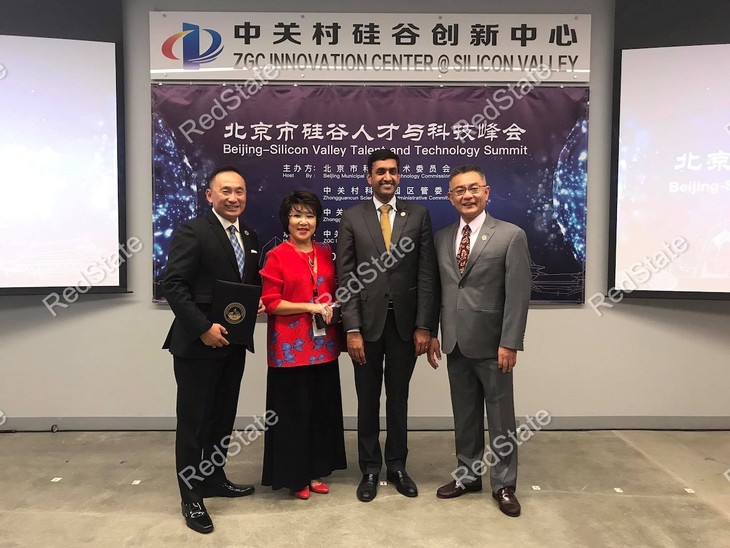
The US Trade Representative’s report mentioned that visit in their comments on ZDG/ZCG:
“In parallel, the company has engaged in talent recruitment. For example, in September 2017, ZGC Innovation Center @ Silicon Valley held a ‘Beijing-Silicon Valley Talent and Technology Summit’ in Santa Clara, attended by the Acting Mayor of Beijing Chen Jining and the PRC’s San Francisco Consul General Luo Linquan. At the event, ZGC Capital Corporation described its ongoing efforts to identify overseas talent and technology that can ‘make a contribution to Beijing’s science and technology innovation development.’ Furthermore, ZGC Group maintains an active partnership with Stanford University.”
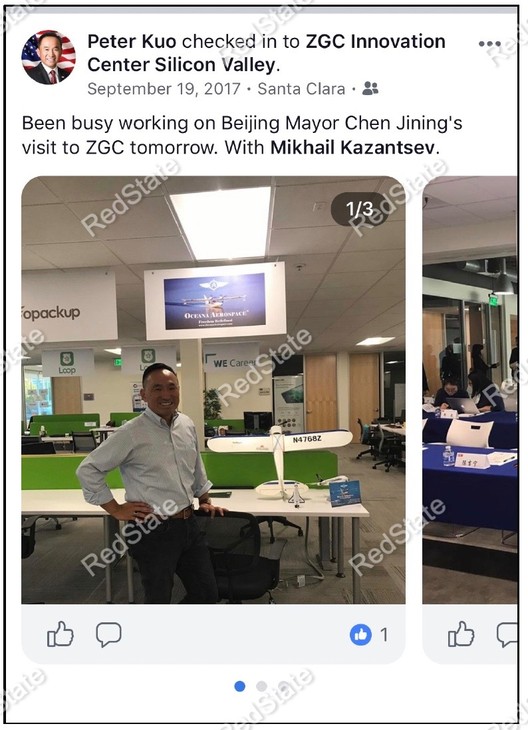
One man who traveled on Kuo’s trips, Jaim Harlow, claims that while on a pitch trip to China organized by Kuo he was detained by government authorities at the airport upon arrival and was followed by them throughout the trip, that his laptop experienced several hacking attempts and firewall breaches during the pitch meetings with investors in an attempt to steal his intellectual property, and that he was poisoned in China after pulling out of the agreement prior to his return home. Harlow also refused to partake in the evening entertainment events Kuo organized, in which alcohol and prostitutes were readily available.
Harlow wrote:
I witnessed more than a few businessmen using their role in China to exploit women. Many of us went to China under the auspices of raising capital because our business plans match China’s plans for medicine[…]. I was followed by PRC intelligence services throughout China. It was hard for them to hide on bullet-trains; I kept moving around to flush em out.
PRC intelligence was listening to everything, watching everything and photographing everything….and while I was in hotel rooms, I could pinpoint the rooms where PRC hackers were staged to attempt to steal from my laptop.
I was poisoned in China, and given the choice of going to hospital, or dying on the airplane en route home, I chose the possibility of dying on the airplane…. I was lucky; they didn’t use thallium, but they used a chemical very similar, which made my hair fall out almost immediately. I’ll save you the other details.
After I returned from my last trip, I was contacted by someone who is an expert in Chinese politics. He asserted “we need to prop up china and keep it stable in order to keep the entire region stable.” You know what? The Soviets used to make those same threats because they know most Americans have never experienced real violence or the destruction of our country. Chinese agents of influence (agents provocateur) have convinced many in this generation that the world will end if China fails and breaks up….
Kuo posted a photo of the group to Facebook and tagged the Chinese state-owned ZGC Innovation Center.
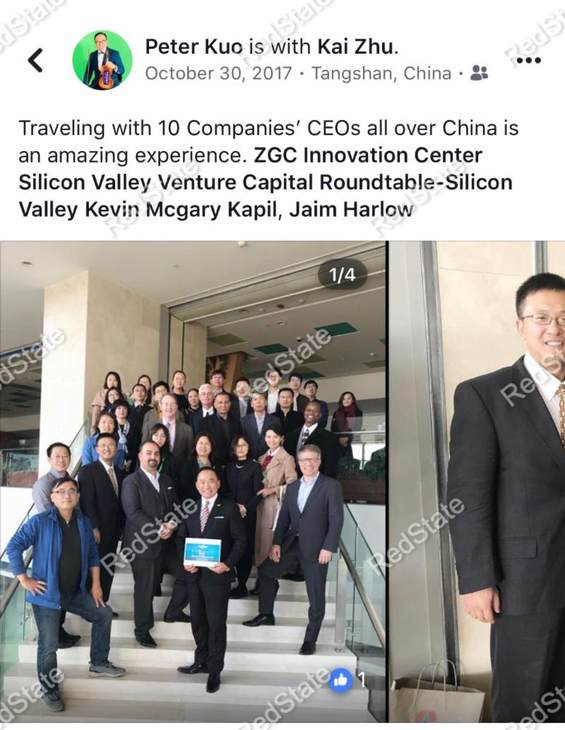
While Kuo has made a lot of noise about his support of Donald Trump and was a delegate to the RNC in both 2016 and 2020, he was also vocal about his disapproval of the Trump administration’s actions related to trade with China. From a January 2019 Reuters article:
Peter Kuo, whose firm, Silicon Valley Global, connects Chinese investors with U.S. startups, said his business has slumped dramatically. In 2018, he said not a single Chinese investor took a stake in the companies he shopped to them.
“CFIUS didn’t kill our organization, but it hampered a lot of startups, and most of them are American startups,” Kuo said.
Interestingly, the company Kuo named there was Silicon Valley Global, which he rarely used in his conversations with Republicans in the state. He also seems to be engaging in deflection, asserting that Trump’s crackdown on China’s flood of dollars into the US tech sector was somehow hampering US startups instead of protecting them from theft. Of course, that might be how he protected himself from retaliation.
A Silicon Valley venture capitalist told Reuters he is aware of at least ten deals, some involving companies in his own portfolio, that fell apart because they would need approval from the interagency group known as the Committee on Foreign Investment in the United States (CFIUS). He declined to be named for fear of bringing negative attention to his portfolio companies.
Kuo also arranged for a Chinese government-linked enterprise that was operating in Sunnyvale to provide office space for volunteers to make calls from for Donald Trump’s 2016 campaign and held multiple political rallies in the offices of Chinese state-owned companies in the United States.
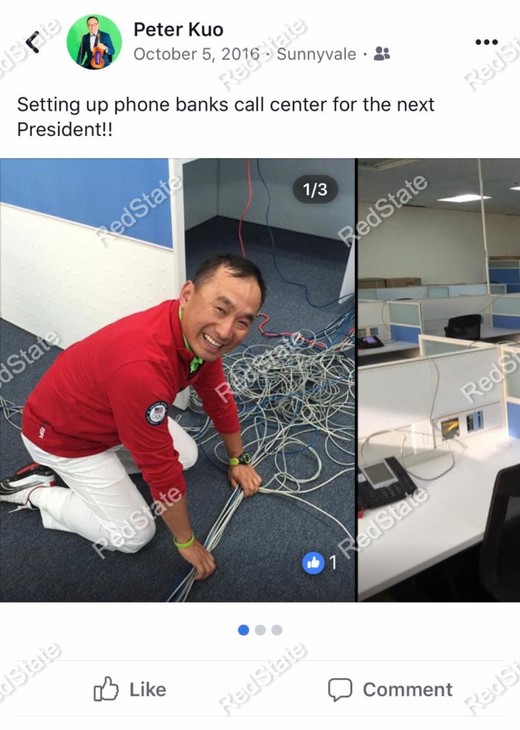
In addition to his partnerships directly with Chinese state-owned enterprises, Kuo is a part-owner of Oceana Aerospace. His partner in that venture is a Russian man, Mikhail Kazantsev. Oceana Aerospace is a d/b/a of Binitech, LLC, a Nevada corporation. According to a Chinese news profile, that company is also part of the Belt and Road project:
“Oceana Aerospace- American small aircraft manufacturer. Company Profile: With world-class “amphibious aircraft” (which can take off and land on land, snow and water), aircraft manufacturers hope to build five production plants and five pilot training schools in China, responding to the policy of the Belt and Road proposed by President Xi, domestically The newly opened low-altitude navigation channel will enter the market in advance for comprehensive market development.”
The same profile lists Oceana executives, including Peter Kuo — with an alias and some resume inflation. Kuo worked on Trump’s 2016 campaign as a volunteer, but his exact status is unclear. He definitely was not a spokesperson on AAPI issues though.
Peter Kuo Guo Zongzheng COO: risk management and product development. Assisting many Silicon Valley companies to improve their valuations, President Trump’s campaign team and Asian Pacific spokesperson.
From Investor.com:
Mikhail Kazantsev is a Russian citizen who has extensive experience in engineering particularly in computer technology, telecommunications and precision mechanics. He has served as President and CEO and co-founder of Binitech Group in Russia, an instructor at Polytechnic University at Chelyabinsk, Russia, and test engineer at Institute of Precise Mechanics at Zlatoust, Russia, who is also a founder in a company by the name of TTE International Inc.
…
“In 1995, TTE International, Inc. was established as a California Corporation with the focus of its resources directed towards international trade. Drawing upon its founder’s expertise in defense technology and trade with the former Soviet Union, TTE International, Inc. carved a niche for itself supplying the U.S. Department of Defense with military spare parts and technical support for Soviet-made military equipment. Subsequently, TTE International, Inc. developed extensive bilateral trade expertise by providing logistical support and complete “turn-key” projects in Russia and the Commonwealth of Independent States, (CIS).”
“The projects we have completed have been in a variety of sectors including aviation, defense, construction, medical and dental technology transfers and mining.”
In September 2018, Kuo signed a strategic agreement with the Chinese city of Xinyi to build an airplane factory and pilot school.
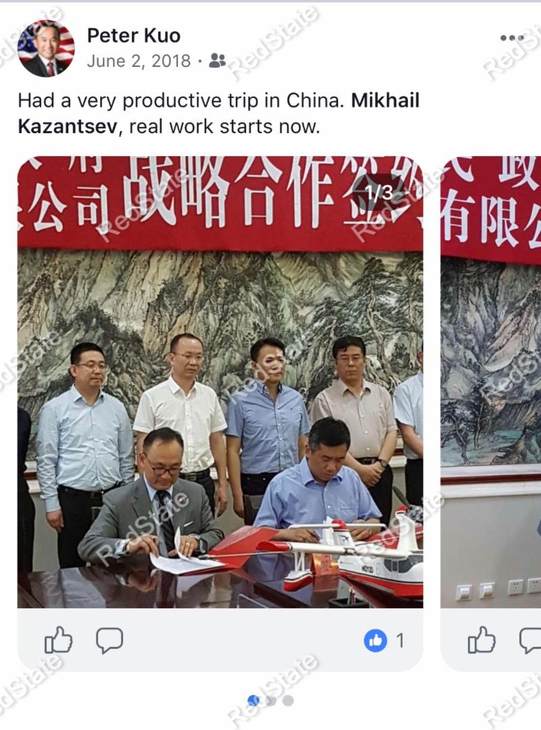
The writing on the wall behind the signers says, “People’s Government Technology Limited Corporation, Strategic Cooperation Signing Ceremony.”
It’s a good thing that Kuo’s time on the CAGOP executive board ends this weekend, but the episode is a sobering reminder that the Chinese Communist Party doesn’t discriminate politically when infiltrating American institutions.
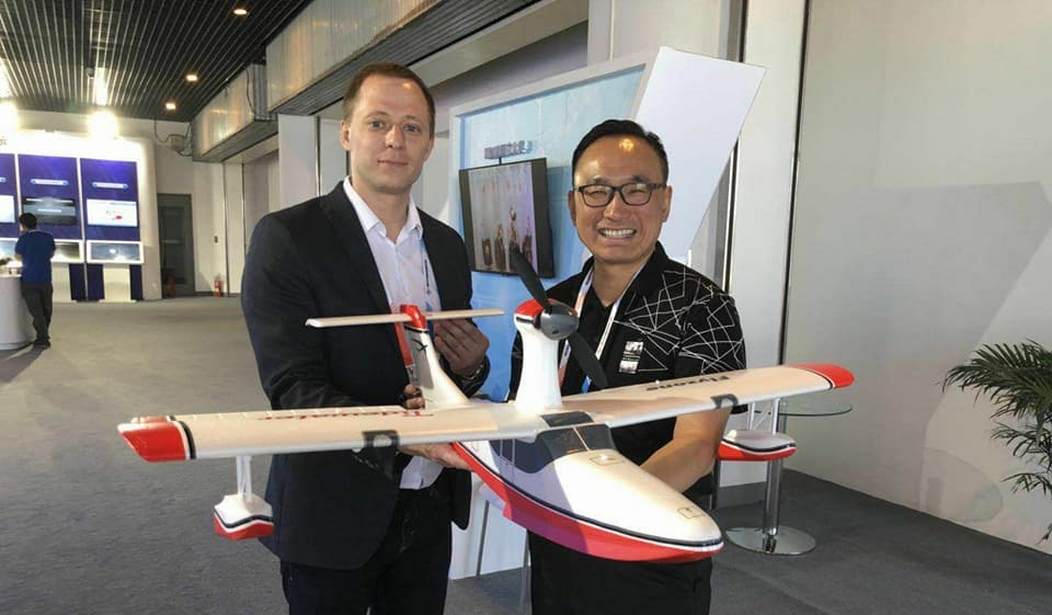












Join the conversation as a VIP Member